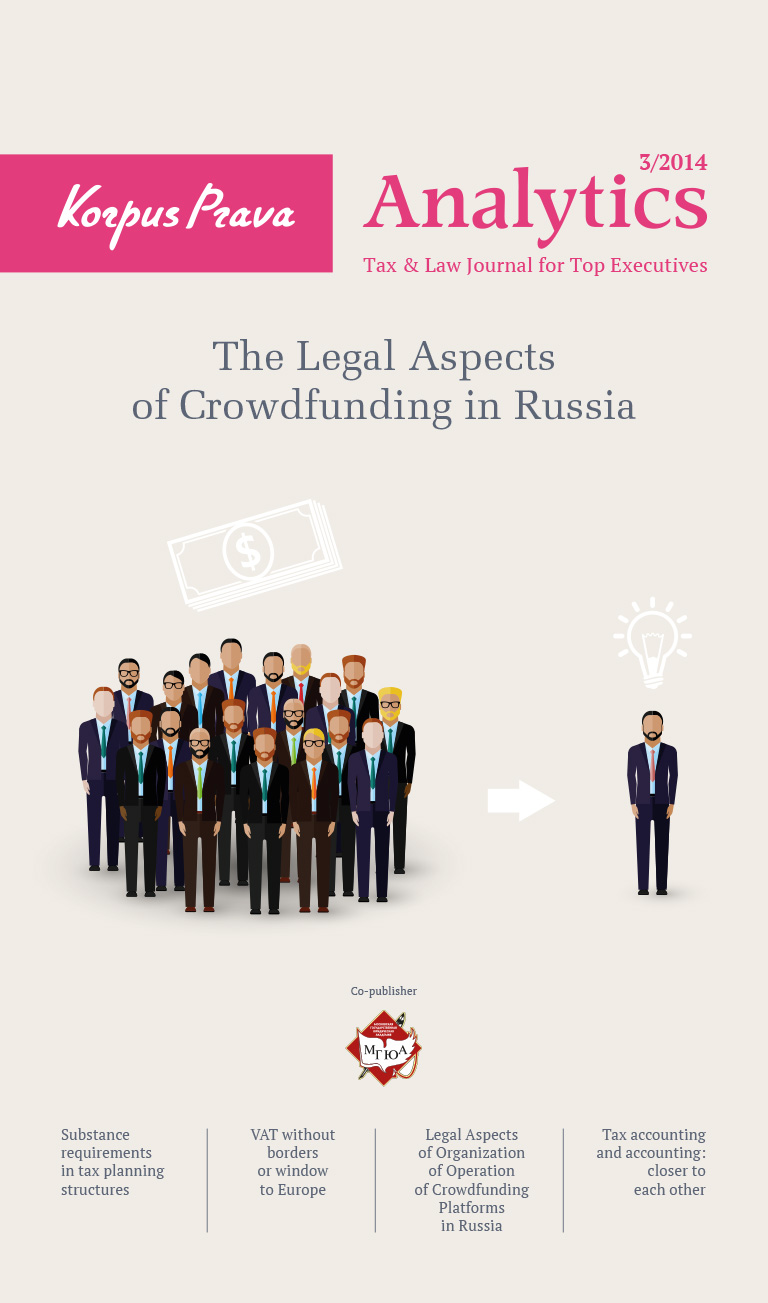- Cyprus Citizenship Scheme for Foreign Investors
- Squeezed But Pleased: Taxation of Passive Income in the European Union
- VAT Without Borders or Window to Europe
- Legal Aspects of Organization of Operation of Crowdfunding Platforms in Russia
- Substance Requirements in Tax Planning Structures
- “Deposit Splitting” of Individuals. Legal Civil and Criminal Aspects
Problems of cryptocurrency regulation in Russia
10 years ago, Satoshi Nakamoto published an article titled “Bitcoin: A Peer-to-Peer Electronic Cash System”. Now cryptocurrencies are considered one of the most promising technologies. Unfortunately, transactions with cryptocurrencies in Russia are not properly regulated, and what is more, they are hardly even reviewed.
Private money has always been in circulation, particularly the one generated by wars, acts of God, economic crisis, regional fights for autonomy (for example, Chechen naxar and Ural frank in the Russian Federation).
In our technologically advanced world private money was reborn due to online payment systems (e.g. PayPal, WebMoney, Yandex.Money (Яндекс.Деньги). Technologies helped to simplify the emission of private money and expand its circulation. Around the same time, loyalty programs started to appear and issue limited means of payment, i.e. miles for plane flights, points for pay cards, as well as game currency which could be converted into real money.
The development of e-money made law-enforcement authorities concerned, particularly for the status of money emitting platforms and absence of control over the volume of private money emission. Moreover, e-money is exposed to failures, and there is a possibility of decline in demand for state money.
Therefore, certain measures were taken to reduce the above-mentioned risks by equating e-money to payment systems or banks with client identification, which caused restrictions of anonymous payments, limited access of legal entities to e-money platforms in order to avoid “leaking” of private money to the settlement system, restrictions of platform powers to manage customers’ accounts.
By equating private money platforms to payment systems the government negated most of advantages inherent to private money. For example, a payment system working online may be located off-shore, but its attempts to create an independent payment system were shut down by the actions of law enforcement authorities and financial regulators.
By the 00s, the development of the Internet allowed to use decentralized structures, which came in handy with all the constant external pressure on the Internet. Decentralized networks spurred the development of decentralized file exchange services, anonymous dark net. Thus, application of decentralized networks to the financial sphere was just a matter of time. The decentralized payment system turned out efficient, as transfers in this system required no intermediaries, and therefore, could not be cancelled or altered. The blockchain technology solved the problem of transaction data forgery, thus contributing to its advantages.
The blockchain technology may be described as follows:
- Decentralized database;
- Managed by the actions of participants, external influence is highly unlikely;
- Open and anonymous;
- Resistant to data forgery, transactions on behalf on any participant are impossible;
- Active participants of the network (miners) are awarded with fees for network performance support.
All these advantages made the platform hugely successful, and cryptocurrency, called bitcoin, became the first implementation of this technology. Consequently, there appeared alternative cryptocurrencies (altcoins) and new decentralized blockchain-based platforms, e.g. Etherium.
Government reaction to the appearance of blockchain technology and cryptocurrencies differed throughout time:
- Initial absence of reaction in 2012-2013.
- Declared warnings against Bitcoin Foundation after the first bitcoin peak in 2013.
- Discussions on the full prohibition in 2014-2016.
- Resolution on the legalization of cryptocurrencies in 2017.
The table below presents mechanics of blockchain technology using cryptocurrencies as an example:

At the moment, first attempts to legalize the blockchain technology in Russia are underway. Thus, the Ministry of Finance submitted one draft law (developed by Anatoly Aksakov), which was registered with the State Duma on March 20, 2018, but the first reading of the draft law has not been scheduled yet. The draft law states that the maximum amount of investments from an uncertified investor to ICO shall be determined by the Central Bank. At the moment, the draft law received an official favourable feedback from the Government with the certainty of 90% chance of passing the draft law upon the first reading, and the fact that this draft law will become a starting point for the blockchain technology regulation in Russia.
The second draft law was submitted by the same Anatoly Aksakov, Pavel Krasheninnikov and Vyacheslav Volodin. This draft law aims at making amendments to the Civil Code of the Russian Federation regarding the introduction of blockchain-related terms and recognition of tokens and cryptocurrencies as property. Law drafters determine cryptocurrency as a digital asset issued and recorded in the register in accordance with an algorithm. It is possible to exchange these assets for currency, but terms and conditions of such transactions are yet to be determined. The Government is expected to determine them together with the Central Bank.
This draft law is also very significant, for it may help to resolve the problem of cryptocurrency taxation by suggesting market cryptocurrency regulation, whereas Aksakov’s draft suggests cryptocurrency regulation under the supervision of the Central Bank.
Both draft laws cover only the financial aspect, while the blockchain technology contributes to maximum transparency and accuracy in legally binding transactions. One of such blockchain-based projects tests Rosreertr upon the transaction registration. Moreover, blockchain is currently being tested for accounting during citizens’ voting in the project ‘Active Citizen’.
One of the key problems of cryptocurrency regulation is taxation. There are suggestions of charging interest against market participants, assigning blockchain companies with a non-bank credit institution status, or extending the patent system to include miners. However, suggested regulation does not correlate with the current legislation. If blockchain is interpreted as an information system, then the technology inevitably falls under IT-legislation with its strict regulatory provisions. Therefore, in order to develop this technology in the Russian Federation, blockchain should be excluded from the definition of the information system.
Besides, there is one more problem related to individual and corporate liability for violations in the sphere of blockchain, cryptocurrency and illegal business activities. The draft law states that mining is a business activity limited by the level of energy consumption, which does not comply with the current Criminal Code of the Russian Federation. Therefore, this problem shall be resolved; otherwise there is a risk of introducing a new business activity with no duly defined requirements.
In China the government pursues the policy of blockchain regulation and prohibition of cryptocurrencies, because the Chinese government believes that cryptocurrencies serve as the means of getting money out of the country. It appears that in case of full prohibition of cryptocurrency in China all Chinese capacities will move to Russia, as Russia is seen as a top-priority region for Chinese miners. However, a substantial barrier of moving to Russia is legal uncertainty regarding blockchain and cryptocurrency regulation. One should remember that moving equipment to the Russian Federation would become a large investment to the country’s economy, but it would require convenient terms of taxation. Now China alternatively considers Canada as a country with favourable conditions for miners. We currently observe the situation similar to off-shoring, when countries start fighting for capital that may be brought in by cryptocurrency. Given the economic downfall in Russia, it is vitally important to answer the question whether we will be able to enter this race or not, and if yes, whether we will be able to make it in time.
Your subscription to our journal will definitely boost the efficiency of your specialists and downsize your expenses for consultants.
The journal is available free of charge in the electronic version.
Free Download

